The 16 Top Personalization Stats for Marketing Professionals
What do you need to know about personalization?


As a Chief Marketing Officer (CMO), it's essential to keep up with the latest marketing trends. And personalization has become one of the biggest trends at the moment. And for a good reason - when done correctly, marketing personalization can be highly effective.
But what does the data say?
This article will talk about ten key marketing personalization stats that will help CMOs understand why personalization is so important, why it's so effective, and how you can improve your marketing strategy.
Below are ten key marketing personalization statistics that every CMO should know and consider in their personalization efforts.
- 91% of consumers say they are more likely to shop with a brand that offers personalized experiences. (Accenture)
- 97% of marketers saw an increase in business results thanks to personalization (Salesforce)
- 63% of marketing professionals say personalization increases customer interactions and better conversion rates (Statista)
- 83% of consumers say they are willing to share their data to receive personalized experiences. (Accenture)
- 66% of consumers expect brands to understand their needs (Salesforce)
- 92% of marketers agree that customers & prospects expect a personalized experience (Evergage)
- 70% of consumers say they are more loyal to companies that understand their individual needs (Salesforce)
- 71% of customers say they get frustrated by online shopping experiences that aren't personalized (Segment)
- 63% of consumers won't buy from brands that have poor personalization (Smart Insights)
- 89% of online businesses invest in personalization (Forrester)
- The most used tactic by email marketers to increase email engagement rates is message personalization (HubSpot)
- 33% of marketers spent over half of their online marketing budget on personalization (Statista)
- 15% of CMOs say their company is on the right track when it comes to personalization (Mckinsey)
- 37% of CMOs say that facial recognition, location recognition, and biometric sensors will become more popular for personalization (Mckinsey)
- 90% of U.S. consumers say that company messages that are not personalized are annoying (Statista)
- 84% of consumers say being treated like a person, and not just a number, is crucial when deciding to support a brand (Salesforce)
91% of consumers say they are more likely to shop with a brand that offers personalized experiences
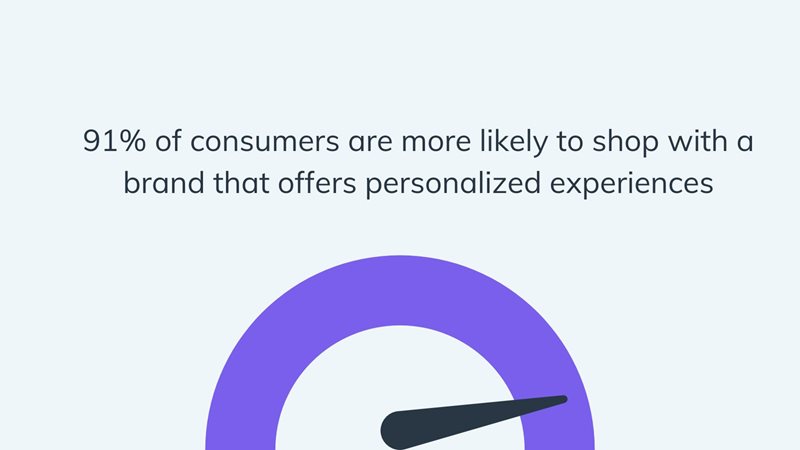
This statistic shows that consumers seek personalized experiences from brands and are more likely to buy from brands that offer them.
Offering personalized experiences can be as simple as using a customer's name in marketing communications or tailoring product recommendations to their individual needs and interests.
It can also mean creating social media content specially made for a specific target audience. Social media personalization is enormous, so make sure your content is aligned with your target's values and needs and that you're scheduling your social media posts on all your social accounts accordingly.
By personalizing your content marketing, you can create deeper relationships with your customers and improve your bottom line.
97% of marketers saw an increase in business results thanks to personalization
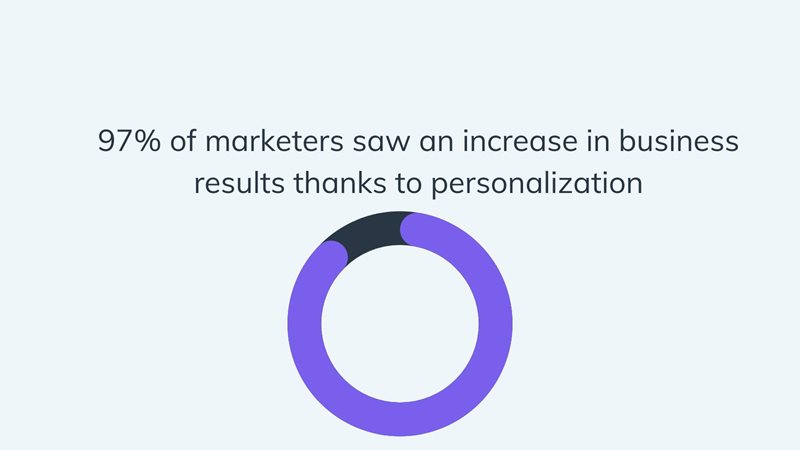
This statistic by Salesforce shows that the vast majority of marketers who personalize their marketing see an increase in business results.
So if you're not already personalizing your marketing, now is the time to start. The benefits are clear.
No matter your business goal, it's likely that even a little personalization will help you achieve it.
63% of marketing professionals say personalization increases customer interactions and better conversion rates
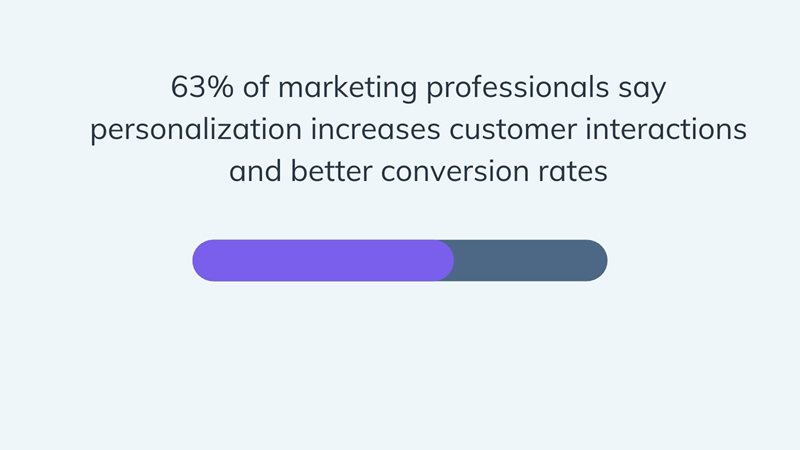
This is another statistic from Statista that proves that personalization works to improve customer experiences and ultimately increase conversions.
With that in mind, it's safe to assume that CMOs who adopt marketing personalization strategies can expect to see an increase in customer engagement, loyalty, and conversions.
Personalization is no longer a nice-to-have; it's a necessity if you want to stay ahead of the competition and keep your customers happy.
83% of consumers say they are willing to share their data to receive personalized experiences
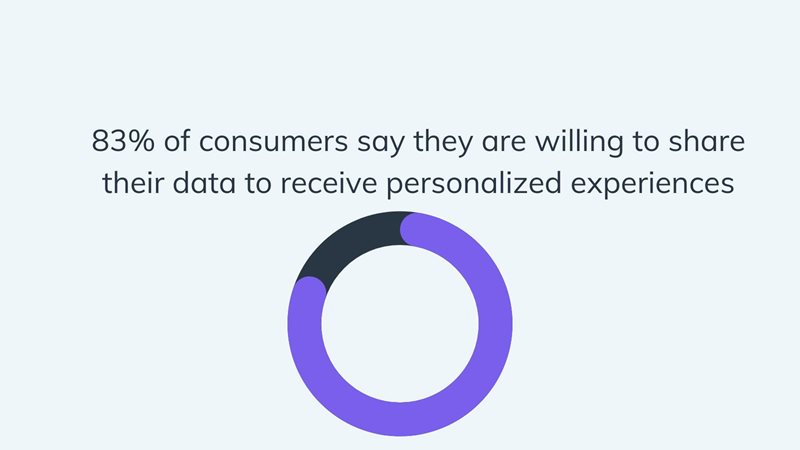
Data privacy has increasingly become an essential factor for consumers. And as a CMO, you want to offer personalization without running into any data issues with your consumers.
But how can you offer personalization without your customer's data?
This statistic shows that transparency is critical when it comes to data usage. People are willing to share their data if they know how it will be used and why it's being collected.
By being clear about how you'll use your customer's data, you can create a personalization strategy that doesn't sacrifice privacy.
66% of consumers expect brands to understand their needs
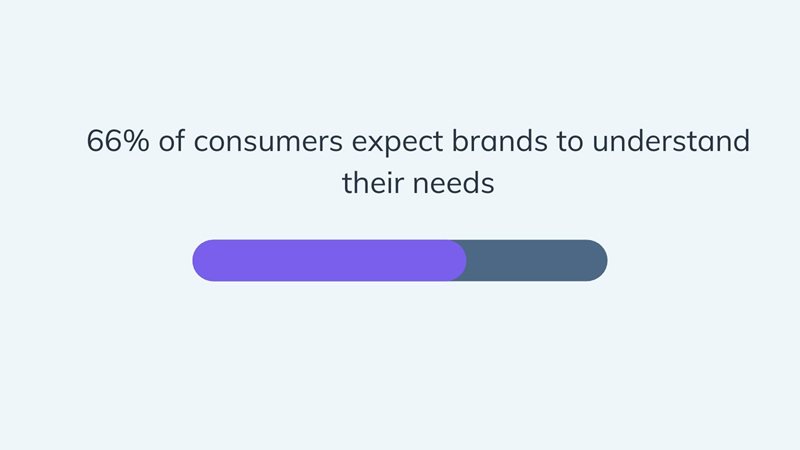
If you don't understand your customers, then you won't know how to market to prospects.
This is another essential marketing personalization statistic because it shows that customers want brands to understand their needs.
The reason is that you can provide better experiences and products.
Asking questions, surveying your customers, and using data analytics are all ways to get to know your target market better.
Once you truly understand what your customer wants, you can create marketing content and product recommendations relevant to their interests.
92% of marketers agree that customers & prospects expect a personalized experience
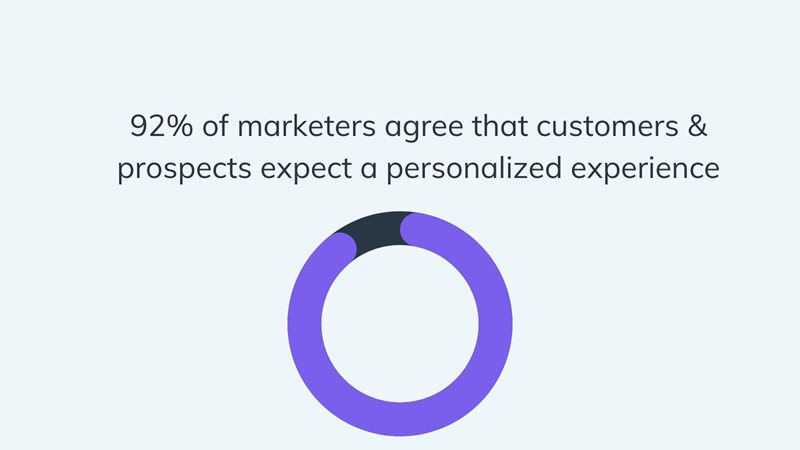
Similar to the previous statistic, people now expect personalization in their interactions with brands.
This means that company interactions that aren't personalized are now considered poor customer experiences.
CMOs need to make sure that their marketing teams are personalizing every touchpoint with customers and prospects, from email communications to website experiences.
The good news is that there are many marketing automation tools available that can help you deliver personalized content at scale.
70% of consumers say they are more loyal to companies that understand their individual needs
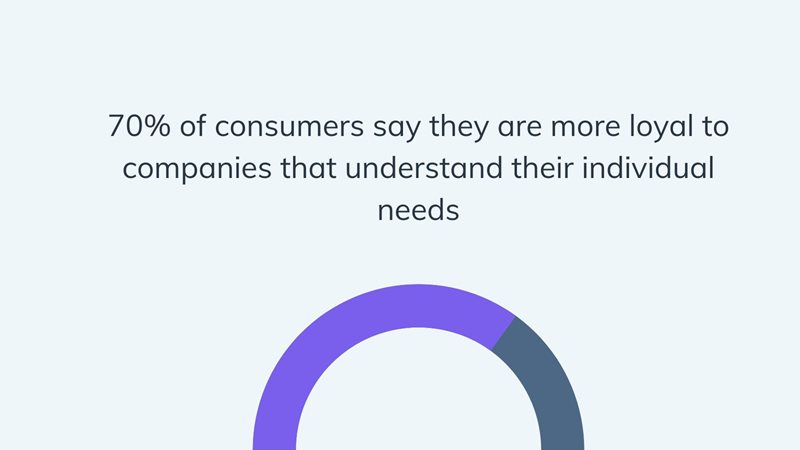
Related to the previous two statistics, understanding your customers will have a significant impact in other areas, like customer loyalty.
It's not enough to understand their needs; you also have to show them that you understand.
This can be done through content marketing communications and customer service interactions.
By showing your customers that you understand them, you can create deeper relationships and turn one-time buyers into lifelong fans.
71% of customers say they get frustrated by online shopping experiences that aren't personalized
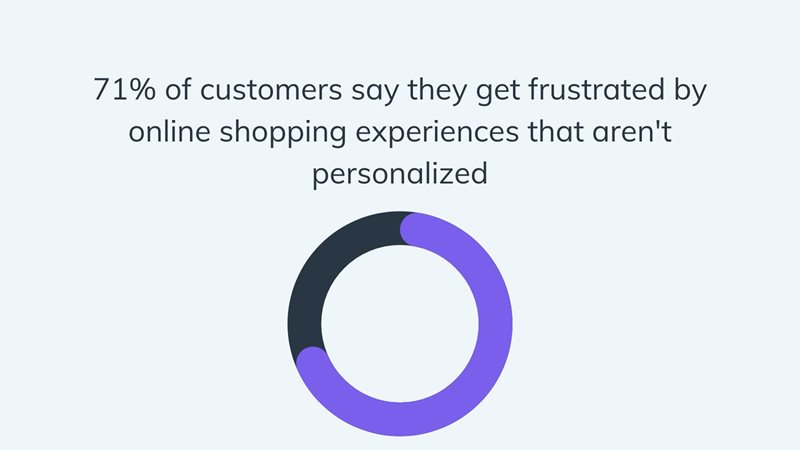
If you're the CMO of an eCommerce, then this statistic should be of particular interest to you.
It shows that customers don't like when they have online shopping experiences that aren't personalized.
For example, when they get recommendations of products they don't need.
And you know that an e-commerce experience needs to be frictionless to convert.
There are a few ways that you can personalize the e-commerce experience, such as by using data to show relevant products, offering customer support, and providing a personalized checkout process.
By personalizing the online shopping experience, you can reduce friction and increase conversions.
63% of consumers won't buy from brands that have poor personalization
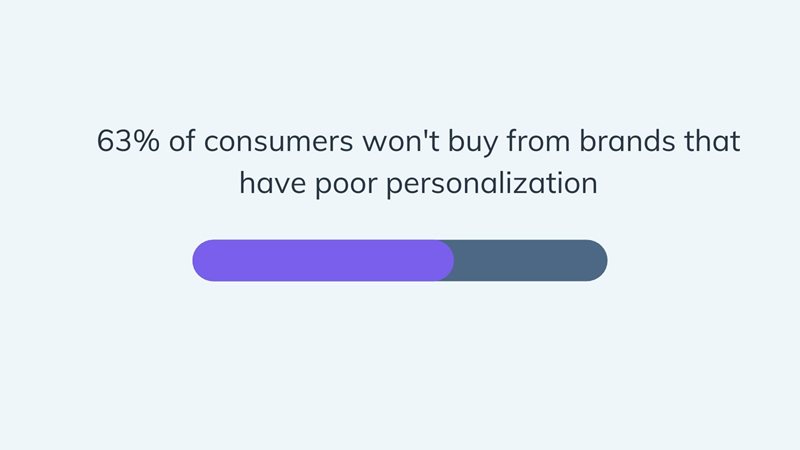
Some people may think that personalization is a plus but not necessary. However, this statistic proves that not including personalization in your marketing strategy can affect you negatively.
In other words, if you don't personalize your marketing communications, you could be losing out on customers and sales.
People avoid brands that don't demonstrate an understanding of their customers.
Note that personalization doesn't have to be complicated.
The key is to start somewhere and then continue testing to improve your personalization strategy over time.
89% of online businesses invest in personalization
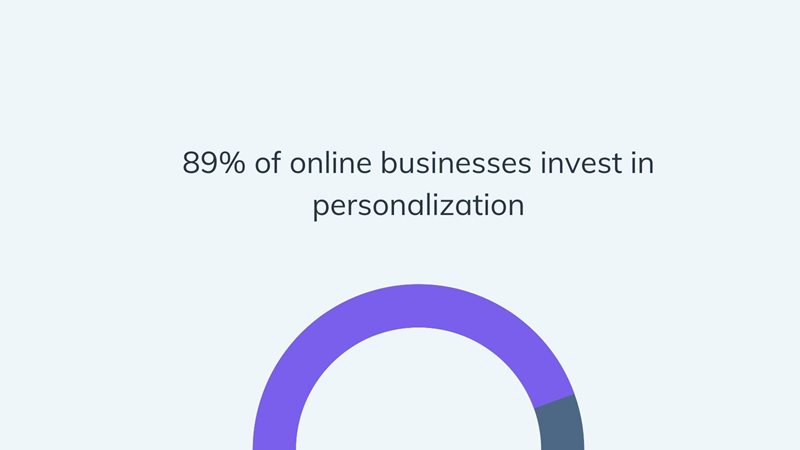
As you can see, personalization is extensive, and the majority of online businesses already invest in it.
This means that if your business is not investing in it, then you may be falling behind the competition.
Investing in personalization can be done in several ways, such as through marketing automation software, hiring a data analyst, or using AI.
Hopefully, you're not part of the remaining 11%, but if you are, then start thinking about how you can personalize your marketing communications and attract more customers.
The most used tactic by email marketers to increase email engagement rates is message personalization.
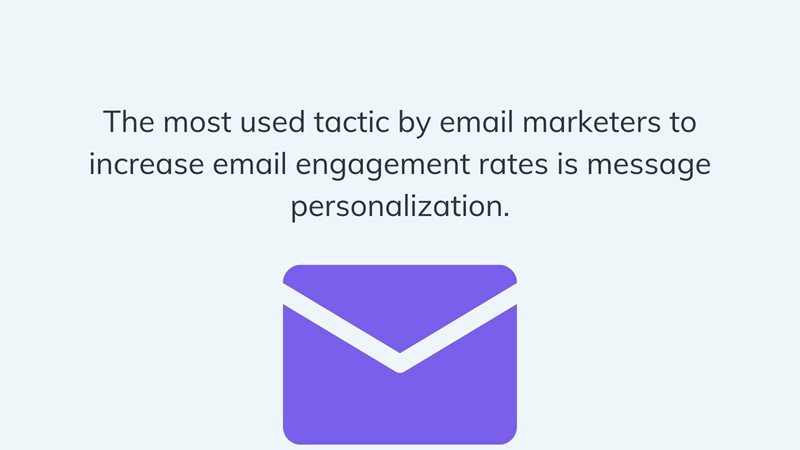
This probably comes as no surprise to you, but message personalization is the most used tactic by email marketers to increase engagement rates.
With so many marketing emails being sent daily, it's crucial to stand out from the rest.
The best way to do this is by personalizing your messages.
There are a few ways that you can do this, such as using the recipient's name, tailoring the message to their needs, or including a personal story.
By personalizing your emails, you can increase engagement rates and get more people to read your messages.
33% of marketers spent over half of their online marketing budget on personalization
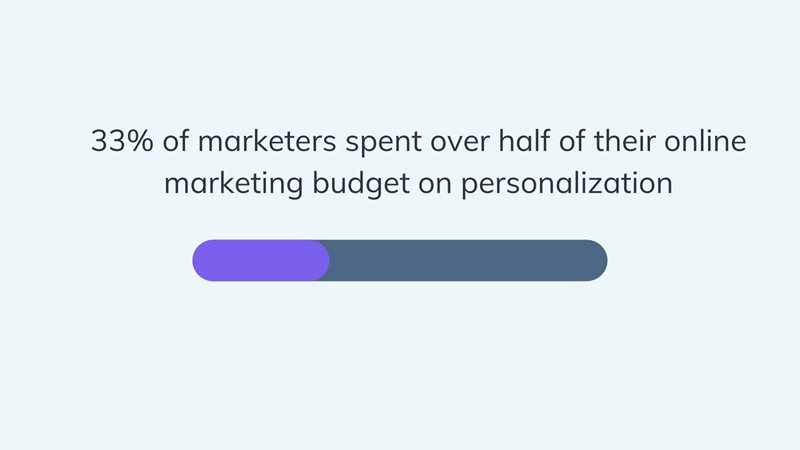
What are the other CMOs doing? Well, they're also investing in personalization.
One-third of marketers are spending over half of their marketing budget on personalization.
This shows that personalization is a priority for many marketing teams.
If you're not already investing in personalization, then now is the time to start.
Allocate a portion of your marketing budget to personalization and see how it can improve your marketing campaigns.
As technology advances, this number will likely grow, so it's vital to stay ahead of the curve.
Personalization is not only important now, but it's also going to be even more critical in the future.
15% of CMOs say their company is on the right track when it comes to personalization
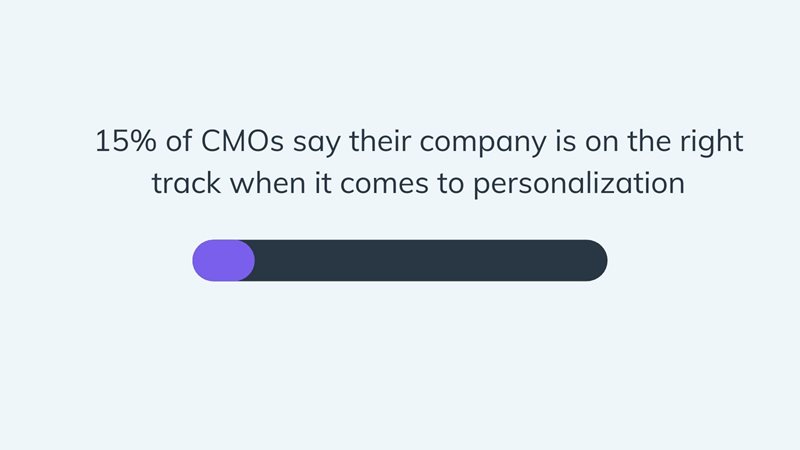
Although most CMOs are investing in personalization, there's still room for improvement.
Only 15% of CMOs say that their company is on the right track when it comes to personalization.
This means that 85% of companies still have some work to do.
There are a few ways that you can improve your company's personalization strategy.
First, you can start by segmenting your audience and then tailoring your marketing messages to each group.
You can also use data to improve your understanding of your customers and then personalize accordingly.
Finally, you can use marketing automation software to automate some of the personalization processes.
37% of CMOs say that facial recognition, location recognition, and biometric sensors will become more popular for personalization
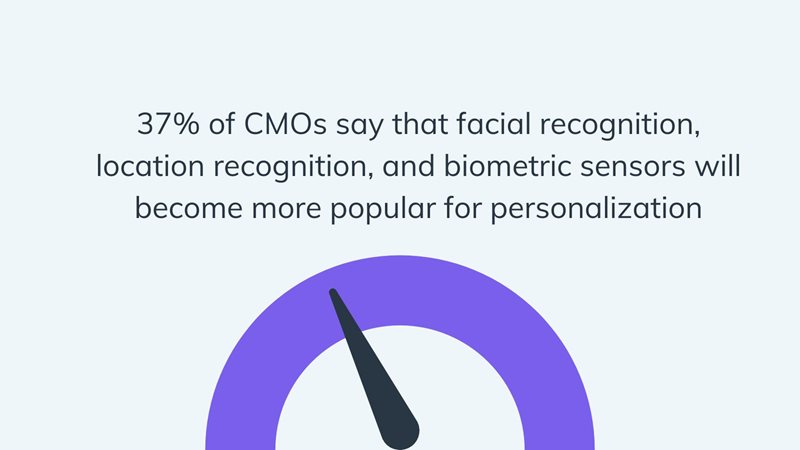
Brands are already using AI-powered tools to provide a personalized and interactive experience to their customers.
For example, Covergirl allows customers to try their products using the image of the person virtually.
Another example is how brands like Starbucks send out special in-app offers to customers near a store.
It's not too difficult to imagine that as technology evolves, companies will be more advanced at generating recommendations based on a person's face, location, biometrics, and more.
And that is what little more than a third of CMOs believe.
90% of U.S. consumers say that company messages that are not personalized are annoying
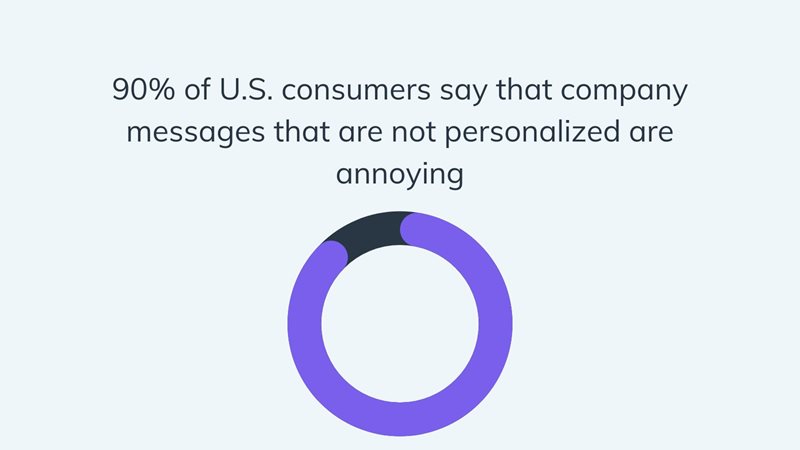
People are tired of generic marketing content. And it's understandable. After all, if you're not personalizing your marketing messages, then you're not speaking to the person.
Instead, you're just broadcasting a message to anyone and everyone.
90% is a vast number, and it should be taken seriously by companies.
If you're still sending generic marketing messages, then you're likely annoying your customers and losing their business.
Use the data that you have on your customers to segment them into groups and then send them tailored marketing messages.
By doing this, you can avoid annoying your customers and improve your marketing strategy.
84% of consumers say being treated like a person, and not just a number, is crucial when deciding to support a brand
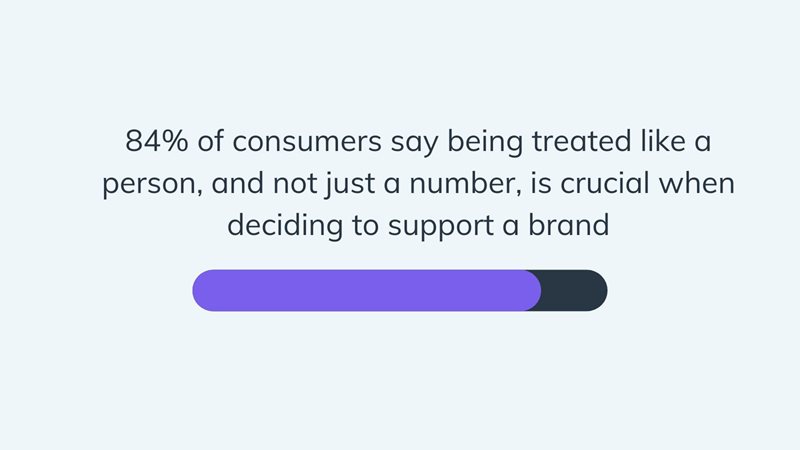
People want to be treated like people and not just numbers.
This is evident in the way that consumers make purchasing decisions.
That's why generic marketing messages don't perform as well anymore.
People want to know that you understand them and their needs.
The best way to do this is by using marketing personalization.
When you personalize your marketing messages, you're showing your customers that you see them as individuals and not just numbers.
This can be the difference between a customer choosing your brand or going with a competitor.
And that is what personalization is all about: understanding your customer and then marketing to them in a way that meets their needs.
Improving your Personalization Tactics
So, what are the final takeaways?
Personalization is essential, not just for marketing purposes but also for building relationships with customers.
CMOs should be allocating a portion of their marketing budget to personalization and continually working to improve their company's strategy.
Finally, if you're not already using AI-powered tools to provide a personalized experience, then you're likely behind your competitors.
Make sure you're staying ahead of the curve by personalizing your marketing strategy. Your customers will thank you for it.

About the Author
View Related Resources

Web Personalization: Its Benefits and Its Use Cases

Grow Your Business With CMSs Designed for Inbound Marketing

How Marketing Automation Improves Your Team's Workflow
How can Agility CMS help with your personalization strategy?
Learn how with a 1-on-1 consultation
Book a Demo
